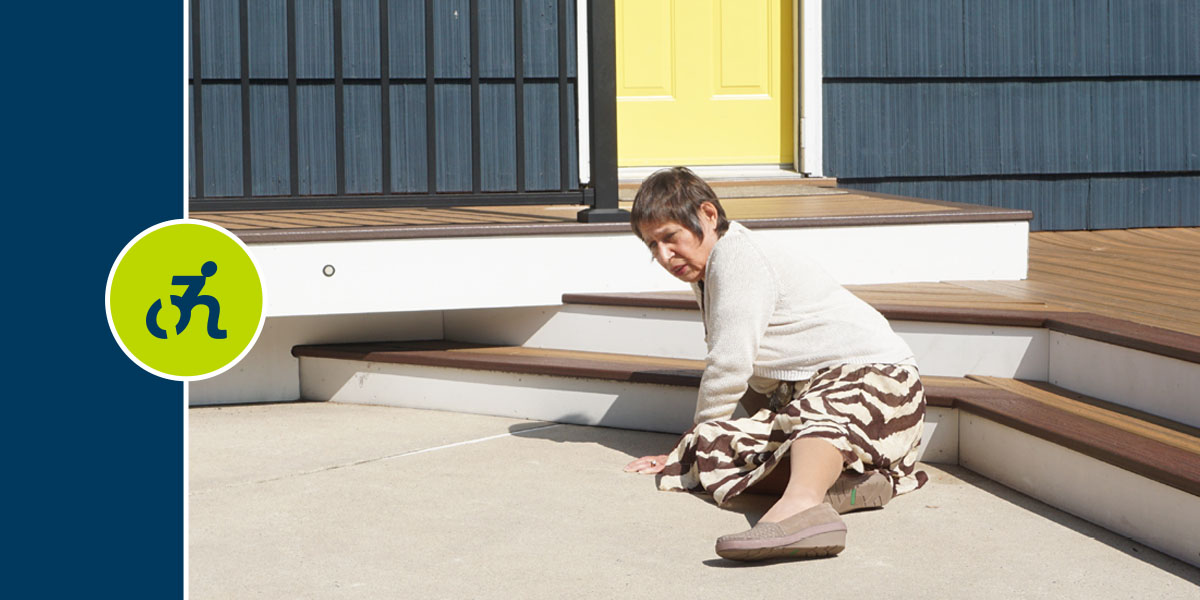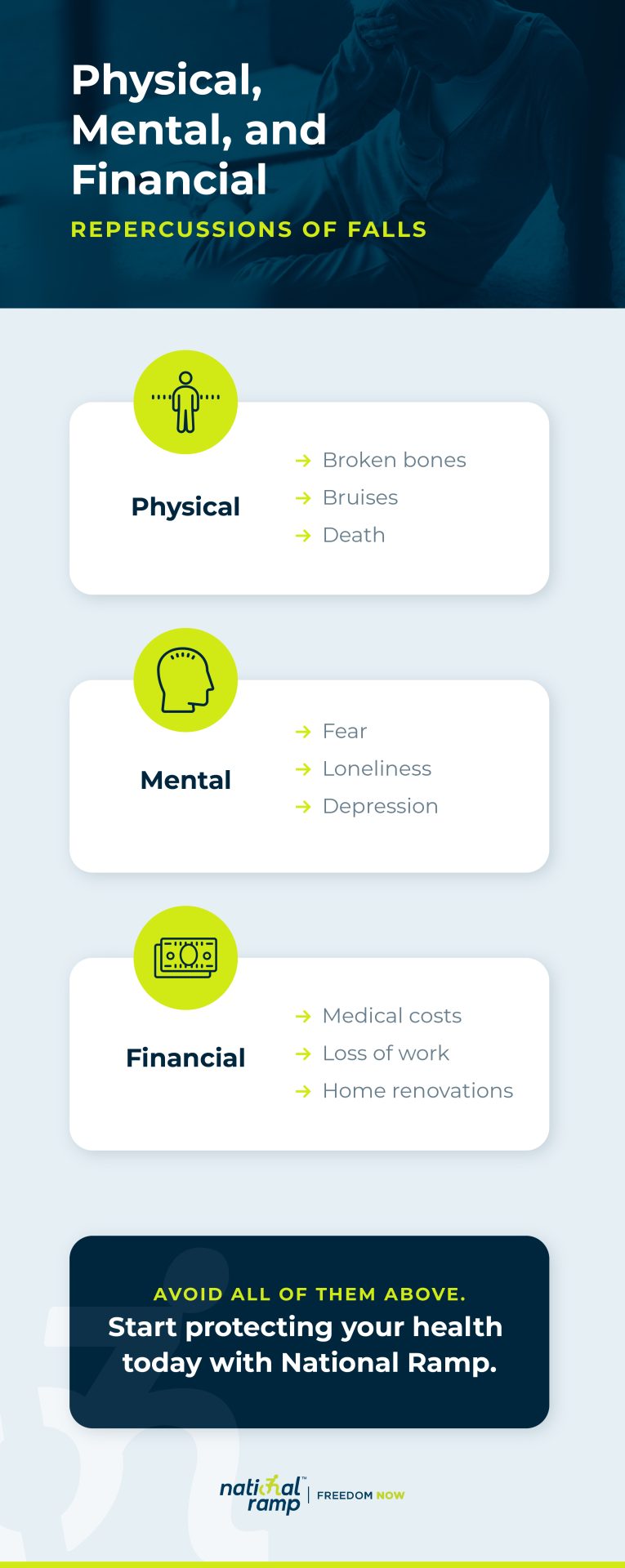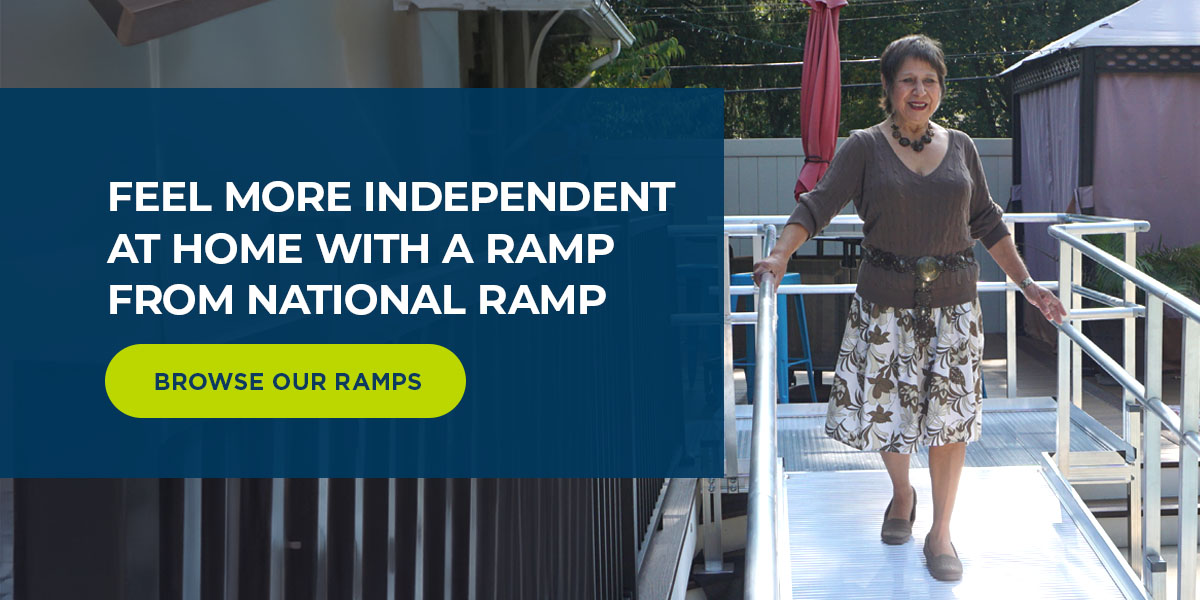
Around 36 million older adults report falls yearly, one out of every five of which causes an injury. While many of us are aware of these physical consequences of falls for older adults, the mental and financial repercussions are seldom talked about — yet extremely important. You’re not alone if you’ve fallen or feel your fear of falling is holding you back. Keep reading to learn the complications of falls and find a solution that can help you regain a sense of confidence and mobility after a fall.
In This Article
- Why Do Older People Fall?
- Physical Consequences of Falls in the Elderly
- Mental Complications of Falls for Older Adults
- Financial Repercussions of Falls for Older Adults
- Feel More Independent at Home With a Ramp From National Ramp
Why Do Older People Fall?
As we age, certain factors increase our risk of falling. Our senses become less sharp, we naturally lose some muscle mass, conditions like diabetes can impact our balance, and certain medications can cause side effects like dizziness or confusion. The recovery period for a fall also increases as we get older.
The fatality rate for older adult falls was 78.0 per 100,000 older adults in 2021, and the life expectancy after a fall for older adults largely depends on the injury’s severity and the individual’s frailty. Some injuries, like a broken bone or a head injury, can lead to a long-term disability or more serious health complications. Still, many falls result in minor injuries or no injuries at all.
How to Help an Older Adult After a Fall
While falls cannot be completely prevented, certain strategies can help prevent the deterioration that may come after a fall. If an older adult in your life has recently fallen, here’s how you can help:
- Set small goals: Encourage them to walk a few steps at a time from the comfort of their home to build their confidence after a fall.
- Have a fall plan in place: Older adults should know exactly what to do in the case of a fall, including who they should call, what to do if they can’t get up and what steps to take if they’re alone. This can make them feel more calm in the situation.
- Encourage them to stay active: Older adults who’ve fallen may not want to exercise, and the lack of activity may make them lose muscle mass, leaving them susceptible to another fall. Encourage them to stay active and positive to keep healthy.
- Keep bones healthy: Strong bones can lessen the chances of injury sustained from a fall. Physical activity can help maintain strong bones, as can eating a diet consisting of calcium and vitamin D.
- Make changes to the home: Installing bathroom grab bars, clearing the home of clutter, implementing handrails on staircases, adding more lights and having a ramp installed can help make a home more conducive to living as an older adult.
Consequences of Falls in the Elderly
Falls among the elderly can have serious consequences, impacting their physical, emotional, and financial well-being. Preventative measures, such as improving home safety, regular exercise to enhance strength and balance, and addressing medical conditions, are critical to reducing these risks.
Physical Consequences of Falls in the Elderly
The physical complications are likely the first thing to come to mind when considering the impact of a fall on an older adult. Some of the possible physical effects of a fall include:

- Broken bones or sprains: Ankles, hips, arms and wrists are susceptible to fractures or sprains after a fall.
- Bruises: Older adults should visit the doctor after every fall, even if their injury is minor, like bruising or swelling.
- Head injuries: Hitting the head after a fall can result in injuries like concussion, traumatic brain injury (TMI) or chronic traumatic encephalopathy (CTE).
- Long lie symptoms: “Long lie” is a term used when older adults who fall cannot stand up, resulting in them lying until they receive help. Long lie can exacerbate the symptoms of a fall. In severe cases, it can lead to pressure sores, dehydration or hypothermia.
- Grueling recovery process: Healing from a fall as an older adult can be a long and physically demanding process.
- Increased susceptibility to falling again: Falling once doubles the possibility of falling again, which can mean a more severe injury.
- Death: Of the about 36 million falls reported among older adults annually, about 32,000 are fatal.
Mental Complications of Falls for Older Adults
Because of the increased health risks, falling — or even the possibility of falling — can mentally strain older adults. Older adults who’ve fallen may experience the following mental complications:
- Fear: Falling once can make older adults fearful of falling again, which may make them less willing to leave home, especially during the wintertime or amid adverse weather.
- Loneliness and isolation: When the fear of falling causes older adults to stay at home, they may withdraw from social activities or family time, which can result in feelings of loneliness or isolation.
- Depression: The reasons for experiencing depression after a fall are broad — older adults may feel discouraged that they cannot move the way they used to, or they may feel depressed due to loneliness. Social interaction has been found to alleviate symptoms of depression in older adults who’ve fallen.
- Embarrassment or decreased self-esteem: Older adults who take pride in their independence may experience a dip in self-esteem after a fall. They may feel less in control of their body or less confident in their movement abilities.
Financial Repercussions of Falls for Older Adults
Medical costs related to older adult falls amount to around $50 billion annually. The following may contribute to these costs:
- Surgery: Serious fractures — especially to the spine or hip — may require surgical intervention, which can be costly.
- Medication: Prescription medication to help with pain or other symptoms may be covered by insurance or paid for out of pocket.
- Long-term hospitalization: Certain injuries may necessitate a longer hospital stay. The average cost of a one-day stay in the hospital in the United States is $2,883, and the average hospital stay is 4.5 days, which amounts to nearly $13,000.
Other financial implications of falls for older adults may include:
- Losing work: Some older adults may still be working at the time of their injury and may lose work if the injury keeps them away from the office.
- Having to move: Older adults facing long-term complications due to a fall may have to move to an assisted living facility or nursing home.
- Walking aids: Investing in walking aids may help older adults who’ve fallen navigate their home or community more confidently and safely.
- Home renovations: When older adults want to continue living at home after a fall injury, they may benefit from home renovations like ramps that are compliant with the Americans With Disabilities Act (ADA).

Feel More Independent at Home With a Ramp From National Ramp
Experiencing a fall doesn’t mean a loss of independence or confidence. National Ramp offers the solution if you or someone you know has fallen and is looking for ways to regain their mobility without giving up their lifestyle or leaving home. Our ADA-compliant ramps can be installed indoors and outdoors to make your home easier to navigate. Explore our aluminum, wooden and steel ramps, or contact us for guidance and to find the right ramp for your needs.
Don’t Risk Injury To You Or A Loved One
Why wait? Give us a call at 877-596-7293 or contact us online to get started!